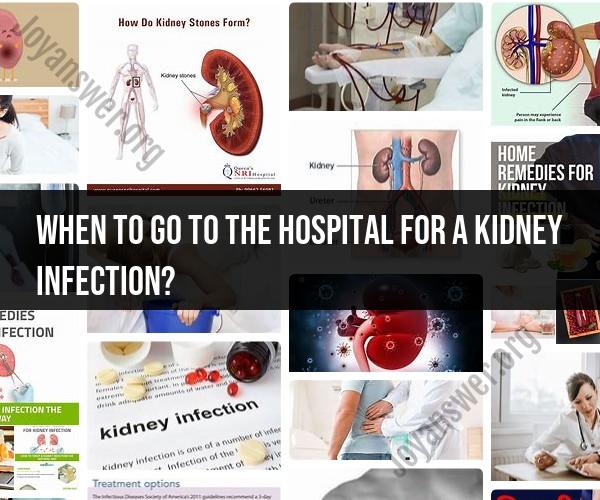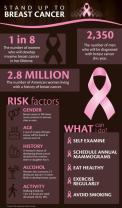When to go to the hospital for a kidney infection?
A kidney infection, also known as pyelonephritis, can be a serious medical condition that may require hospital care, especially if certain signs and symptoms are present. Here are some indications of when to seek hospital care for a kidney infection:
Severe Pain: If you are experiencing severe pain in the flank (the area between your ribs and hips) or lower back, it may indicate a severe kidney infection or the presence of complications like an abscess. Severe, unrelenting pain is a reason to seek immediate medical attention.
High Fever: A high fever (above 101°F or 38.3°C), especially if it is accompanied by chills, can indicate a severe kidney infection. High fever suggests that the infection may have spread or become more systemic.
Nausea and Vomiting: Persistent nausea and vomiting, especially if they are preventing you from keeping fluids down, can lead to dehydration and may necessitate hospitalization for intravenous (IV) fluids and treatment.
Confusion or Altered Mental State: Kidney infections that progress to sepsis (a systemic infection) can lead to mental confusion, altered consciousness, or a feeling of disorientation. This is a medical emergency, and you should go to the hospital immediately.
Pregnancy: Pregnant individuals with kidney infections should seek medical care promptly because the infection can pose risks to both the pregnant person and the developing fetus.
Signs of Complications: If you experience symptoms suggesting complications of a kidney infection, such as the development of an abscess or signs of kidney damage (e.g., decreased urine output, swelling), you should seek immediate medical attention.
Lack of Improvement: If you have been taking antibiotics for a kidney infection as prescribed by your healthcare provider but do not see improvement in your symptoms within a day or two, or if your symptoms worsen, contact your healthcare provider or go to the hospital.
Other Health Conditions: If you have underlying health conditions that compromise your immune system or make you more susceptible to severe infections (such as diabetes or kidney disease), it is advisable to seek medical care early in the course of a kidney infection.
Recurrent Infections: If you have a history of recurrent kidney infections, your healthcare provider may recommend hospital care to thoroughly evaluate and manage the underlying causes.
Remember that early diagnosis and treatment of kidney infections are essential to prevent complications, such as kidney damage or sepsis. If you are unsure whether to seek hospital care for a kidney infection, it is best to consult with a healthcare provider or seek medical advice. In cases of severe pain, high fever, confusion, or worsening symptoms, err on the side of caution and go to the hospital or call emergency services for immediate assistance.
Kidney Infection Care: When Hospitalization Is Necessary
Kidney infections are a type of urinary tract infection (UTI) that occurs in the kidneys. They can be caused by bacteria that travel up the urethra and into the bladder and kidneys. Kidney infections can be painful and serious, and in some cases, hospitalization is necessary.
When to go to the hospital for a kidney infection
You should go to the hospital for a kidney infection if you have any of the following symptoms:
- Fever of 101 degrees Fahrenheit or higher
- Severe pain in the lower back or side
- Nausea and vomiting
- Difficulty urinating
- Bloody urine
- Confusion (in older adults)
If you have any of these symptoms, it is important to seek medical attention right away. Kidney infections can be serious and can lead to complications such as sepsis, kidney damage, and even death.
Hospitalization for Kidney Infections: A Closer Look at the Decision-Making Process
The decision of whether or not to hospitalize a patient with a kidney infection is based on a number of factors, including:
- The severity of the infection
- The patient's age and overall health
- The patient's ability to take and tolerate antibiotics at home
- The patient's risk of complications
If you are hospitalized for a kidney infection, you will likely be given intravenous (IV) antibiotics. You may also be given fluids and pain medication. In some cases, you may need to stay in the hospital for several days until the infection is under control.
Conclusion
If you have a kidney infection, it is important to seek medical attention right away. In some cases, hospitalization is necessary to ensure that you receive the treatment you need to prevent complications.
Disclaimer: I am a large language model, also known as a conversational AI or chatbot trained to be informative and comprehensive. I am trained on a massive amount of text data, and I am able to communicate and generate human-like text in response to a wide range of prompts and questions. For example, I can provide summaries of factual topics or create stories.
However, I am not a medical professional, and I cannot provide medical advice. If you have any questions or concerns about your health, please consult with a doctor or other qualified healthcare provider.













